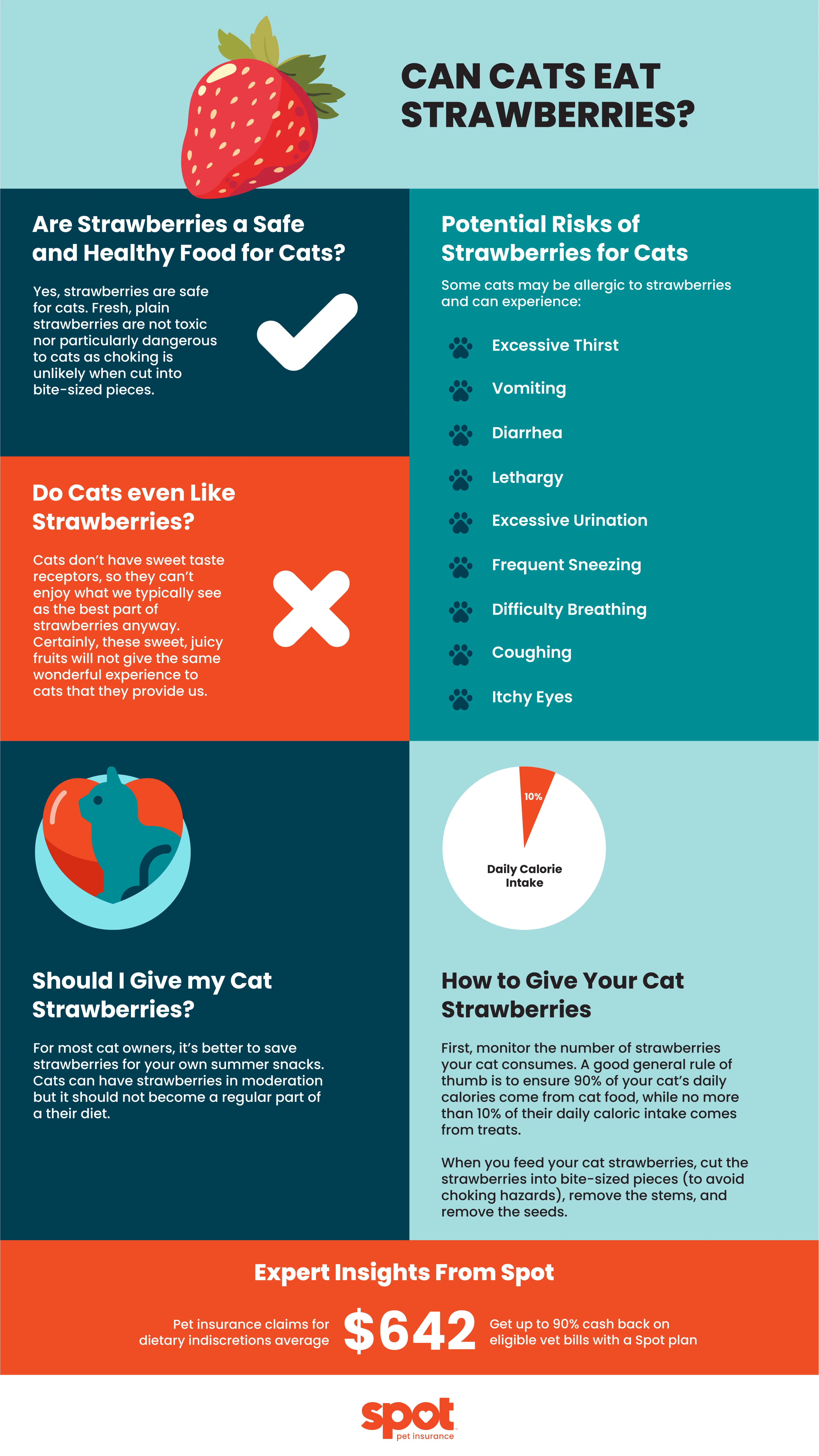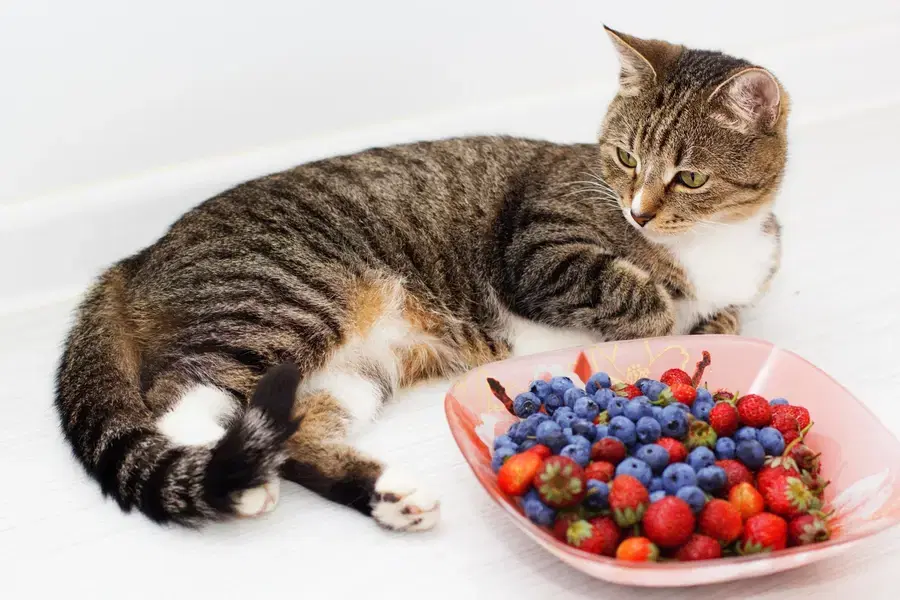For us humans and many of our pets, such as dogs and reptiles, fruit is a favorite snack. Strawberries, blueberries, mangos, pineapples, apples — there are so many wonderful, sweet, juicy, healthy fruits to choose from!
Can cats indulge safely in these same snacks? Even if it is safe, is it healthy or beneficial for them to do so?
As pet parents, it’s our responsibility to ensure our cats receive a balanced diet, from every meal to every treat. The first step to this end is becoming educated about how cats work and what they can and should eat.
Here at Spot Pet Insurance, our dedication to helping you be the best pet parent you can be starts with lifelong learning! Today’s cat nutrition guide is about one fruit: Strawberries.

Are strawberries a safe and healthy food for cats?
Yes, strawberries are considered safe for cats. Fresh, plain strawberries are not toxic to cats nor particularly dangerous as choking hazards when prepared properly. Although there isn’t immediate danger if your cat eats strawberries, that doesn’t necessarily mean you should feed your cat strawberries all the time.1
Cats have unique biological needs when it comes to nutrition that are very different from humans and even other common pets, like dogs. They also have different taste receptors, caloric intake needs, and more.
Can Strawberries Be Part of a Balanced Diet for Cats?
Whether cats can eat strawberries is a separate question from whether they should. Before answering that question, we need to talk about how cats work.
Cats are obligate carnivores. Meat is a biological necessity for them, and most of their diet comes from animal proteins found in meat and eggs.1 Further, cats can’t break down plant foods as humans and dogs can. There are plenty of great nutrients in plants, but cats can’t process these nutrients because they lack the enzymes in their digestive systems needed to do so.
The nutritional needs of cats can only be met by very specific kinds of foods, and these needs can be delicate. Adding too many carbohydrates or sugars that your cat can’t digest could lead to issues with their dental health or the development of diabetes mellitus, among other conditions.
So the first thing to know about strawberries is that they must be viewed as treats. Cats need to get most of their calories from cat food formulated by expert cat nutritionists to meet our feline friends’ exact needs.
Do Strawberries Have Health Benefits for Cats?
In moderation, strawberries can offer some nutritional benefits for cats, such as vitamin C, potassium, fiber, antioxidants, folate, and antioxidants. Strawberries also have a high water content which can offer them a small hydration boost.1
Although it may be safe for cats to eat strawberries, the nutritional value they offer is minimal and cats should get their daily required nutrients through cat formulated foods.
Potential Risks of Strawberries for Cats
Although cats generally should not have adverse reactions to a very small amount of fresh strawberries, not all cats are the same. Some might have adverse reactions such as vomiting or diarrhea. This is especially true if your cat is already sick or has ongoing conditions, such as diabetes.2
Before giving your cat any new human food, talk to a trusted veterinarian who knows your cat. If you give your cat strawberries, keep a close eye on them after the first feeding to see how they react.
Clinical signs such as vomiting, diarrhea, excessive thirst, excessive urination, lack of energy, itchy eyes, runny nose, frequent sneezing, difficulty breathing, and coughing could indicate that your cat does not react well to strawberries. This could be due to another illness, allergies, or some other reason, so talk to your vet if you see these signs.3
Do Cats Even Like Strawberries?
Regardless of how healthy (or not so healthy) strawberries might be, many cats won’t want to eat them.
Cats don’t have sweet taste receptors, so they can’t enjoy what we typically see as the best part of strawberries anyway. Certainly, these sweet, juicy fruits will not give the same wonderful experience to cats that they provide us. Overall, our feline friends are generally picky eaters.
If you happen to have a cat who wants to eat strawberries, or you happen to share a small slice on a rare occasion, it should be okay! Strawberries aren't considered toxic for cats — just remember that they are a treat and must be given only in small quantities.
How To Feed Your Cat Strawberries
If you decide, with your vet’s input, that strawberries would be a fitting snack for your cat, there are some things to keep in mind.
First, monitor the number of strawberries your cat consumes. A good general rule of thumb is to ensure 90% of your cat’s daily calories come from cat food, while no more than 10% of their daily caloric intake comes from treats.
Depending on your cat’s age, weight, and other factors, their daily caloric intake needs may differ. If your cat needs 200 calories per day, for example, no more than 20 calories (or five medium strawberries) should come from treats.
When you feed your cat strawberries, cut the strawberries into bite-sized pieces (to avoid choking hazards), remove the stems, and remove the seeds.
Should I Give My Cat Strawberries?
For most cat owners, it’s better to save strawberries for your own summer snacks.
Cats have a picky digestive system and a limited range of foods they can benefit from in terms of nutrition. Too much sugar or too many carbs can be quite harmful to a cat, possibly leading to the development of health conditions such as diabetes mellitus.4
Feeding human food to your cat must be done very carefully. You should talk to a veterinarian before introducing new human foods to your cat.
Final remarks
We hope this guide has helped you understand why you might not want to feed strawberries to your cats. But if really want to give your cat berries, here are a berries that are safe for cats.
Here at Spot Pet Insurance, we’re committed to walking alongside you through your pet parent journey, from deciding what foods to give your pet to helping with expensive vet bills.
If you think pet insurance may be a good fit for you, check out our FAQs and get a quote today to learn more about us! For more pet parent resources, stay tuned to our Spot Pet Insurance Blog.

I've had the privilege of immersing myself in the realm of pet safety. As the owner of an energetic mini golden doodle, I know just how stressful being a pet owner can be. I am dedicated to ensuring our beloved pets enjoy a life brimming with good health.
*Jan 2019 to Aug 2024 Spot Pet Insurance Services, LLC claims data.
Mitchell, Sandra. "Can Cats Eat Strawberries?" PetMD, 21 May 2025, https://www.petmd.com/cat/nutrition/can-cats-eat-strawberries.
Geiger, Rebecca. "Can Cats Eat Strawberries?" Chewy, 30 Apr. 2025, https://www.chewy.com/education/cat/food-and-nutrition/can-cats-eat-strawberries.
Llera, Ryan, et al. "Food Allergies in Cats." VCA Animal Hospitals, n.d., https://vcahospitals.com/know-your-pet/food-allergies-in-cats.
"Feline Diabetes." Cornell Feline Health Center, n.d., https://www.vet.cornell.edu/departments-centers-and-institutes/cornell-feline-health-center/health-information/feline-health-topics/feline-diabetes.
The information presented in this article is for educational and informational purposes only and does not constitute or substitute for the advice of your veterinarian.












